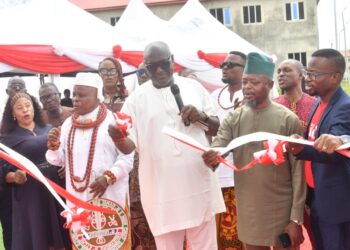The European Union (EU) has admitted that the ongoing security challenges ravaging the country, especially, in the agric sector, needs to be nipped in the bud by government as it is encroaching on its €11million Nigeria’s agric project, known as, the Nigeria Competitiveness Project (NICOP).
Particularly, it said, this is threatening the efforts to boost food sufficiency and food security attainment in Nigeria, with skyrocketing prices in food products, food shortages and in ability of many homes to feed three square meals.
However, the NICOP is a four-year project commissioned by the German BMZ and co-funded by the European Union under the West African Competitiveness envelope. It is being implemented by GIZ Pro-Poor Growth and Promotion of Employment in Nigeria Programm- SEDIN.
The EU’s NICOP project started operations in Nigeria in August 2018 and is expected to be wind down in February 2023, in completion of its four-year programme to catalyse Nigeria’s agric and manufacturing sectors via its intervention funding and support to the smallholders farmers, processors, local manufacturers in garment and leather industries and others in terms of value chains.
Head of Project, NICOP of EU in Nigeria, Ana Vindmbres, speaking in a recent interview in Lagos, noted that, EU, its core donors, funded NICOP with a €11million funding that was meant to aggregate and also act as a catalyst for agric development in Nigeria, in its quest to contribute to food security and sufficiency in Nigeria.
She explained that, NICOP has been supporting the country’s food basket with funding, grants and interventions since it was designed to support key value chains in Nigeria, focusing on tomato (including pepper and chili), ginger, leather and garments.
According to her, NICOP’s aim is to promote structural transformation, to overcome coordination and linkage failures and to improve access to regional and international markets while taking social and environmental concerns into account.
In addition, she added that NICOP has been assisting micro, small and medium-sized enterprises (MSMEs) to take advantage of opportunities to add value and migrate to new and higher-level tasks along selected value chains.
She pointed out that NICOP too is working at federal level and in seven focal states, namely; Abia, Kano, Kaduna, Lagos, Ogun, Oyo and Plateau states.
In addition, she added that the project will also work in any other state in Nigeria where there is and opportunity to achieve sustainable results in any of the selected value chains.
She however, added that, aside the €11 million support from the EU and German BMZ, NICOP has further gone ahead to facilitate about N600 million credit facility among the country’s financial institutions and DFID, such as, Bank of Industry, to assist smallholders farmers and local manufacturers to boost Nigeria’s economy.





